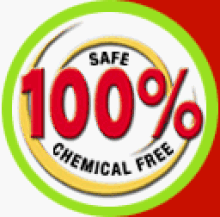I recently bought a bag of cat litter, and noticed that it was labelle d “chemical-free”. So I guess it’s really made of magic fairy granules? (I would have said “magic fairy dust”, but it was labelled “dust-free” also.)
d “chemical-free”. So I guess it’s really made of magic fairy granules? (I would have said “magic fairy dust”, but it was labelled “dust-free” also.)
Then there was the time I ran across some “chemical-free” sunscreen – the label proudly declared that it contained zinc oxide, chemical formula ZnO2.
Recently, the “Food Babe” publicly criticized the “people who want to keep the chemicals in our food”. In the same article, she recommends that people should follow her example and start every day by drinking lemon juice* in water, which is “very alkaline and can stimulate the liver”. I can’t imagine why people still give credence to her advice about chemistry after her complaint that the air in airplanes “isn’t pure oxygen either, it’s mixed with nitrogen, sometimes almost at 50%”. (Fair enough, not everyone is interested in chemistry and many people try to forget it as quickly as possible after leaving highschool. But someone who claims to be an expert, and says that she has a background in science (Computer Science, actually) really ought to be able to at least check her facts to the extent that they can’t be debunked in a few seconds with Wikipedia.)
So yes, please keep the chemicals in my food – munching on vacuum is really boring, and not particularly life-sustaining. On the other hand, perhaps we could lobby to get homeopathic preparations labelled “chemical-free”? In that case, it would actually be honest and accurate, at least with respect to the “active” ingredients that have been diluted out of existence.
* For those who (like the Food Babe) may have forgotten their highschool chemistry, I’ll point out that acidity/alkalinity is measured using the logarithmic pH scale, with lower numbers being more acidic. Lemon juice has a pH of 2 – less acidic than sulfuric acid – (used in car batteries – pH 1), but more acidic than vinegar (pH 2.2). Plain water has a pH of 7, our blood is 7.4, and baking soda is 8.3.